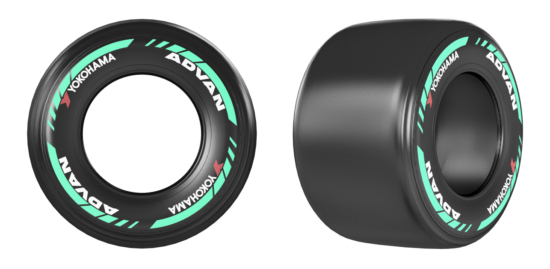Yokohama Rubber reducing CO2 footprint of motorsport tyres
 Mishima-made tyres are now being supplied to the Japanese Super Formula Championship (Image: Yokohama Rubber)
Mishima-made tyres are now being supplied to the Japanese Super Formula Championship (Image: Yokohama Rubber)
Motorsport tyres manufactured at Yokohama Rubber’s Mishima plant in Japan are now being made on a production line powered by electricity from renewable sources. The tyre maker switched motorsport tyre production in Mishima to renewable-energy electricity in January and looks forward to these tyres contributing to “carbon neutrality in motorsports events held in Japan and around the world in 2023.”
Yokohama Rubber emphasises that the electricity it uses to power the motorsport tyre production line is entirely derived from renewable sources. Electricity provider Tepco Energy Partner, Inc. confirms these sources generate zero CO2 emissions and verifies this with FIT non-fossil fuel certificates that contain tracking information as well as non-FIT certificates for renewable energy sources such as hydropower plants.
The Mishima plant produces Yokohama motorsports tyres for races around the world, such as the Japanese Super Formula Championship and the Super GT races in Japan, the Nürburgring 24-Hour Race in Germany, and the Pikes Peak International Hill Climb in the United States.
Towards carbon neutrality
Yokohama Rubber describes the shift to renewably sourced electricity on the motorsport tyre production line in Mishima as its latest initiative to achieve carbon neutrality and develop a sustainable motorsports industry. In line with the goal of achieving net zero CO2 emissions by 2050, Yokohama Rubber is promoting carbon neutrality at its production sites, self-generation and procurement of renewable energy, energy-saving activities, and nature positivity through its tree-planting and biodiversity conservation activities. In addition to achieving carbon neutrality, By 2050, Yokohama Rubber aims to exclusively utilise sustainable materials.
Motorsport tyres in Mishima are now produced on a line powered by renewable energy (Photo: Yokohama Rubber)
The company also is accelerating its motorsport-related goals in relation to carbon neutrality and circular economy. One recent success here is the supply of Yokohama tyres with 33 per cent sustainable material content for use in this season’s Japanese Super Formula Championship races. Sustainable materials within these tyres include natural rubber, naturally derived compounding agents such as oil from oil palm fruit nuts and orange peels, recycled iron, rubber recycled from waste tyres, and synthetic rubber made using the mass-balance method. According to Yokohama Rubber, these tyres maintain “the excellent grip performance” of conventional tyres used in these races.
Mishima-made tyres for racing in dry conditions were available for the opening round of the Japanese Super Formula Championship earlier this month, and Yokohama Rubber aims to begin supplying wet weather tyres from July. Looking ahead, the company says it will continue working to further raise the sustainability material ratio of its motorsport tyres.




Comments